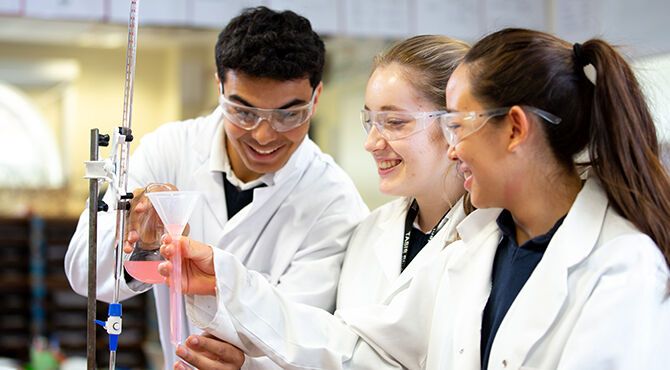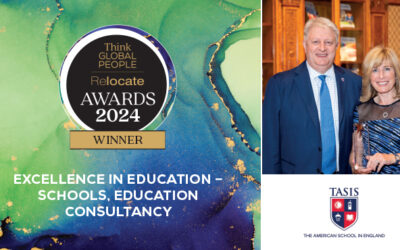Beyond results: TASIS explores the questions parents need to consider when selecting a school
An exercise schools routinely undertake is to create a profile of their graduates, writes Bryan Nixon, Head of School, TASIS The American School in England. For parents, the question is: what will this school provide to ensure my child thrives?
Qualities stand the test of time
Once a school initiates this process of identifying the attributes that represent the core of the graduate, it is revealing and powerful to see the characteristics emerge.
They do not include words like “excellent grades” or “great test-takers,” but they do include attributes — or qualities — such as being principled, compassionate, and open-minded.
In a landscape where schools are rightly held more responsible for business-oriented concepts such as higher standards of accountability, expectations, and targets, it is equally important that school leaders and teachers do not lose sight of their sense of moral purpose.
In my experience, in addition to academic rigor, schools want to provide service, create community, stimulate inquiry, and nurture a sense of justice and equality.
In my almost 25 years in international education, I am humbled to have belonged to and served such learning communities. We are fortunate to have school governors, leaders, faculty, and staff committed to inspiring future generations to gain more from school than just knowledge and academic success.
While gaining the knowledge students need to continue their learning journey is important, so is the development of attributes that will promote a focus on community as well as self and define our current generation of students as principled, compassionate, and open-minded.

A broader perspective on high performance: service leadership
When school governors, leadership teams, faculty, parents, and students focus on more than test scores, it can transform their learning. These schools flourish through the positive and supportive relationships they build, both within the school and the wider communities to which they belong.
Community service features high on the list of priorities, and as compassionate school community members reach out, they will be inspired by those for whom they provide service.
While many international schools offer service experiences to far-off countries well beyond their local communities, schools focused on high-quality service leadership opportunities tend to focus more on their local communities to develop long-term, sustainable relationships.
This service becomes much more than simply helping others and develops a sense of responsibility that inspires learning. We learn so much about ourselves and our community through dealing with the challenges others face.
This is prevalent at the current time as many local communities struggle with rising inflation, where families find it more difficult to feed themselves or meet the demands of energy costs, and support for those in need is usually the hardest hit from the inevitable budget cuts of local authorities. Imagine what children committed to service leadership will learn and carry with them as they become future leaders!
Options and opportunities

In addition to authentic and reciprocal service leadership, these flourishing schools also provide balance through a range of educational pathways that offer a wide variety of subject areas and co-curricular activities that engage students in learning through physical, cognitive, and affective domains.
Athletics programs, offering a wide range of sports and activities and competition with other schools, become less focused on results and winning but more focused on the development of the individual and the team and the exploration of attributes that link back to the school’s mission.
Other metrics become important such as participation levels, an increase in offerings, the quality of the coaching provided and the attributes that the school’s athletes portray when in competition.
Active and eclectic arts programs allow for the exploration of self and others as well as our connection to the world around us. In addition, a wide range of clubs and activities ensure each child can find a voice and a place to explore and perhaps even challenge themselves to do something completely out of their comfort zone without fear of failure or critique. Throughout all this, the stimuli for an individual to thrive are not just evident; it is infectious.
Relationship with self and others
Students from these schools commit to the quality of relationships they wish to have with their peers and teachers. They are confident in the areas in which they find joy and success and when faced with challenges. This self-assurance enables our young people to embrace the possibility of failure and to pursue a less well-travelled but ultimately more illuminating path.
This courage sparks innovation through the opportunities that students, teachers, and school leaders identify that will enhance learning and teaching. Such innovation and creativity go far beyond introducing various technologies and revising course guides or content. It delves into the exploration of meaningful questions and real-world issues, providing our future leaders with the ability to be open-minded enough to embrace and analyse multiple perspectives and opinions, to respectfully communicate their questions, suggestions, and solutions, and to effectively collaborate with others to resolve complex and dynamic issues.
As educators, we know how important rigour and results are in determining school success, as evidenced by the plethora of marketing emails and posts we see from schools following the release of examination grades each summer. But we need to courageously take that additional and challenging step to focus our school communities on creating opportunities for our children to inquire, explore, and discover within and beyond whatever content our curriculum defines. In this way, we will promote the skills and attributes that will serve them (and us) well in the future.
The strength of this foundation will help schools truly embolden our children and inspire a life-long passion for learning that will ensure they are ready for whatever challenges face them and their communities in the future.


 Magazine
Magazine


